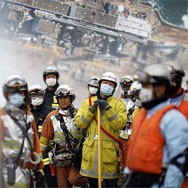You are in:
- Area of Communication and Media |
- Other News
Start of main content
Princess of Asturias Awards 09/07/2011
The “heroes of Fukushima”, 2011 Prince of Asturias Award for Concord

©FPA
The 2011 Prince of Asturias Award for Concord has been bestowed on the “heroes of Fukushima”. The Jury for the Award announced its decision today in Oviedo.
This group of people represent the highest values of the human condition by trying to prevent, through their sacrifice, the nuclear disaster caused by the tsunami that struck Japan from multiplying its devastating effects, disregarding the grave consequences that this decision would have on their lives. Their courageous and exemplary behaviour has earned them the international epithet “heroes of Fukushima”.
This candidature was put forward by Josep Piqué i Camps, president of the Spain-Japan Council Foundation (Madrid) and seconded, among others, by Miguel Angel Navarro, Spain’s ambassador to Japan; Fernando Salazar, vice-president of the Spanish Institute of Foreign Trade; Juan José Herrera, director general of Casa Asia; Daniel Hernandez, rector of the University of Salamanca; and Alberto Ruiz-Gallardón, Mayor of Madrid.
Following the massive earthquake and tsunami that occurred in north-eastern Japan on March 11, 2011 and which caused around 28,000 deaths and displaced some 350,000 people, Fukushima nuclear power plant suffered significant damage resulting in hydrogen explosions and fusion of nuclear fuel. The International Atomic Energy Agency and the Japanese government initially placed the alert levels between 5 and 6 on a scale of 7, and finally at 7, as after the Chernobyl accident.
Despite major uncertainty regarding the development of the nuclear emergency, the different groups that worked for weeks in Fukushima did so under extreme conditions (high radiation, continuously rotating shifts and only a few hours of rest, and limited supplies of food and drinking water). Despite these grave consequences, they continued to participate in the efforts to regain control of the nuclear plant, aware of how essential their work was to prevent a catastrophe of even greater magnitude.
The work was carried out by different groups of people: employees of the Tokyo Electric Power Company (TEPCO), the plant’s operator; of its 130 workers, 50 volunteered, as did some workers who had already retired or were nearing retirement, and, after increasing the number of rotating shifts and the needs for personnel, additional staff was hired (by May 3, 1,312 workers had intervened in Fukushima); fire fighters from various prefectures, especially from Tokyo, who participated in the work of cooling the reactors, a key task to restore control of the plant; and the police forces and Self-Defence Forces of Japan, whose work cooling the reactors by launching water from helicopters, inspecting the damage from the air, cordoning off the exclusion area and evacuating people when the reactors emitted very high doses of radiation was very important.
The behaviour of these people has also embodied the values most deeply rooted in Japanese society, such as the sense of duty, personal and family sacrifice for the greater good and dignity in the face of adversity, humility, generosity and courage.
Prince of Asturias Awards
According to the Statutes of the Foundation, the Prince of Asturias Awards aim “to reward the scientific, technical, cultural, social and humanistic work performed at an international level by individual, institutions or groups of individuals or institutions”. As part of this spirit those “whose work has contributed in both an exemplary and relevant way to understanding and peaceful coexistence among mankind, to the fight against injustice, poverty, disease or ignorance, to the defence of freedom, or that has opened up new horizons to understanding or has stood out, in a likewise extraordinary manner, in the conservation and protection of mankind’s heritage” may be nominated for the Prince of Asturias Award for Concord.
This year a total of 44 candidatures from Algeria, Argentina, Costa Rica, Cuba, Chile, Egypt, France, India, Israel, Italy, Japan, Mexico, Norway, Palestine, Peru, Ruanda, Tunisia, United States, Zimbabwe and Spain ran for the award.
This is the last of the eight Prince of Asturias Awards to be bestowed in their thirty first edition. The 2011 Prince of Asturias Award for the Arts went to Italian conductor Riccardo Muti, the Prince of Asturias Award for Social Sciences was given to US psychologist Howard Gardner, the Prince of Asturias Award for Communication and Humanities went to British institution The Royal Society, the Prince of Asturias Award for Technical and Scientific Research was jointly bestowed on neuroscientists Joseph Altman, Arturo Álvarez-Buylla and Giacomo Rizzolatti, the Prince of Asturias Award for Literature was given to Leonard Cohen, the Prince of Asturias Award for International Cooperation went to Bill Drayton, founder and Chair of Ashoka and the Prince of Award for Sports was given to Haile Gebrselassie.
Each of the Prince of Asturias Awards, which date back to 1981, is endowed with 50,000 Euros, a commissioned sculpture donated by Joan Miró, a diploma and an insignia. The awards will be presented in the autumn in Oviedo at a grand ceremony chaired by H.R.H. the Prince of Asturias.
End of main content
Sección de utilidades
Fin de la sección de utilidades
- Legal document Legal document (Access key 8)
- | Privacy policy Privacy policy (Access key )
- | Social networks ???en.portal.pie.menu107.title???
- | Cookies ???en.portal.pie.menu110.title???
- | Site map Site Map (Access key 3)
- | Contact Contact (Access key )
- | XHTML 1.0
- | CSS 2.1
- | WAI 'AA
© Copyright 2024. FUNDACIÓN PRINCESA DE ASTURIAS





